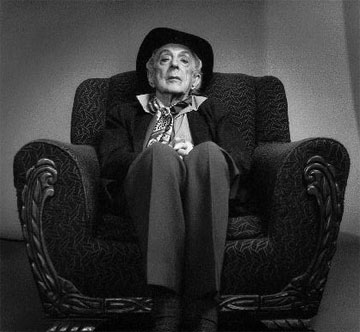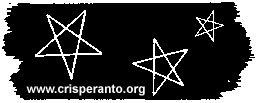 THE WORLD WOULD BE BETTER WITHOUT HOMOSEXUALS? Quentin Crisp Responds (Yet Again) to Controversy. by Guy Kettelhack |
|---|
|
The following 1997 interview (which Mr. Ward has here, remarkably, somehow rediscovered and disinterred) was conducted at the anxious behest of the late Connie Clausen — Quentin's and my agent — who hoped that I might be able to extract from Quentin a softening if not a retraction of his provocative and widely reported statement to The London Times: that he'd counsel a mother to abort her fetus if, genetically, it could be predetermined to be gay. This was a thankless task for both of us — not least because it expressly required Quentin to violate one of his most heartfelt tenets: "never defend." My questions now seem hamhanded, forced; his answers seem remarkably graceful and gracious, given the unpalatable nature of the aim: to "justify" his opinions. To me, the essence of what Quentin had to say here (and elsewhere) is simply this: the world is hurtful; who would willingly choose to be hurt? (Quentin would have loved to spare everybody pain.) However, given the reality (not likely to change) that we have to deal with the world anyway — despite its cruelties — Quentin, through his own vibrant example, admonished us to live as fully as we could. You have to look at Quentin's life as well as his words to get anything close to the full, delicious irony and impact of the man. He was always more than you thought he was. Eighty-eight-year-old Quentin Crisp, no stranger to being attacked, has done it again: enraged the Politically Correct, and even the Moderately Tolerant, with various comments about the implications of cloning and the possible discovery of a "gay gene" — how, in light of recent advances in genetic science, he would countenance a parent’s decision to abort a fetus genetically destined to be homosexual because he believes (as The London Times put it), "the world would be better without homosexuals" (The Times’ phrase, not Mr. Crisp’s). Predictably — once again, in a lifetime of doing so — he has enraged not only gay activists but virtually anyone who subscribes to "liberal" views of tolerance. For all of his long life, Mr. Crisp has expressed his view to anyone who will listen that anything other than conversation between two human beings is a "mistake": sex, music, art, travel, sports — and the construction of an identity based solely on one’s sexuality. Homosexuality, to him, is thus also a "mistake" because, in his view, "it colors everything the homosexual does and gets in the way of life." This Q&A will attempt to clarify his views — views he has been expressing since he could speak and write them. The latest reaction from The London Times surprises Mr. Crisp because he has expressed so many similar unpopular opinions so many times before, especially his wish, because of a sexuality and temperament which he believes made him unfit in the heterosexual, middle-class English world of his parents, that he had "never been born." Indeed, his first response the unilateral attack he as received is bewilderment: Quentin Crisp: What, I wonder, do they expect? I ended my autobiography with the words "I stumble to my grave confused and hurt and hungry." These are not the words of a man ecstatic to be here. Guy Kettelhack: But surely you’re not surprised that you’ve caused offense by saying that all homosexuals ought not to have been born as well? That we all are a mistake? QC: I had no intention of troubling anybody with any of my views, certainly not my publisher, my agent, nor the public. If anything I do say gives offense, I am happy to retract it, and we can all go on as if nothing unpleasant had happened. I do try to say and write what I think, and it has never occurred to me that I have to like homosexuality to write it or anything else. My books are not about homosexuality except as I have been asked to speak about it. GK: Well, let me ask you to speak about it now, if I may. Do you believe that homosexuality is pathological and should be eradicated? QC: I believe what my nature inclines me to believe. I believe I was born unfit for the world not because of anything to do with sex, but because of gender. I have always felt like a woman born into a man’s body. Had I the money or the opportunity early in life, I would certainly have had a sex change. Although because that would have made me a sex-change freak instead of the freak I already was, it probably wouldn’t have solved anything really. I felt I had no choice but to stumble on as I was, and throw myself on the mercy of the world. When I wrote my autobiography, and [my editor] Mrs. Miller came across the words "I was disfigured by pathological homosexuality," she said, "You can’t say that." So I said I was disfigured by a certain kind of homosexuality. But my belief has not changed. I believe that homosexuality is pathological when it colors every single aspect of your life as it has colored mine. When every word you speak and every action you take proclaims "I am a homosexual" before all else, this seems to me regrettable. You are crippled by it because it separates you from the majority. There is a kind of homosexuality that is not pathological, and that is when you accept it simply as one part of many parts that makes you you. When it overshadows all other traits, it seems to me a mistake. GK: So there are only "certain kinds" of homosexuality that are pathological? QC: Yes, I would say so. You see, when I was young, I hated all of the sex. It was never satisfying. It simply made me the passive object of another homosexual’s will. When you make your sex life everything, you are doomed. That’s why sex is a mistake. It doesn’t get you nearer to people, it separates you more. GK: What do you say to people who feel you are not meeting your responsibility as a positive gay role model or helping us to achieve gay rights? QC: I do not regard myself as a symbol of anything except myself. I think it’s a great mistake for minorities to assume they can demand their "rights." I don’t think anyone has any rights. I think you fall out of your mother’s womb, you crawl across open country under fire, you grab at what you want, and if you don’t get it you go without, and you flop into your grave. So, you have to make up your mind whether to grab what you want, fight for it, or ask for it. Now if you’re in a minority, the only thing you can do is ask for it, because otherwise you will lose. I don’t believe in role models. If I represent anything beyond myself, I represent the idea of living your own life without doing any particular harm to the world. All you can do is be who you are, and then let the world form round you as it will. I once met Mr. William Burroughs. Within minutes of our being introduced, he said, "What is worth having is worth fighting for," and I replied, "That which we can only maintain by force we should try to do without." GK: So, it’s only those aspects of ourselves we "maintain by force" that we should eradicate, whatever our sexuality? QC: Yes. GK: Any parting words? QC: I am for everything and everybody. I want what you want. Read Mr. Crisp's Statement of Apology. Also read Mr. Kettelhack's other 1997 Quentin Crisp interview "Popcorn for the Soul." Also see his article at NightCharm.
|
|
Interview copyright © 1997 / 2007 by Guy Kettelhack. All rights reserved. Used by permission.
Photograph copyright © by Edward St. Marc. All rights reserved. Used by permission. |


Site Copyright © 1999–2008 by the Quentin Crisp Archives
All rights reserved.